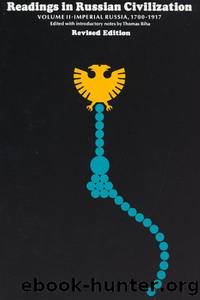Readings in Russian Civilization Volume II by Thomas Riha

Author:Thomas Riha [Riha, Thomas]
Language: eng
Format: epub
ISBN: 9780226718446
Barnesnoble:
Publisher: University of Chicago Press
Published: 2009-02-15T00:00:00+00:00
* * *
1 For Pobyedonostsev, see the reading (No. 33) later in this volume.
2 Count Mikhail Loris-Melikov (1825â88) became minister of the interior in 1880.
3 The proceedings of the case were not published until 1906, when the Russian censorship was considerably relaxed.
32
A SLAVOPHILE STATEMENT
By Ivan Aksakov
From Olga Novikova, Skobelev and the Slavonic Cause (London: Longmans, Green & Co., 1883), pp. 354â2.
With his brother Konstantin, and with Iurii Samarin, Ivan Aksakov (1823â86) led the second Slavophile generation. The first period of Slavophilism, inaugurated by Aleksei Khomiakov (mentioned below) and Ivan Kireevskii, came to a close with the Crimean War (1854â56). The second period may be said to have ended with Ivan Aksakov's death. He had been a civil servant in various parts of Russia during the 1840âs. After fighting in the Crimean War as a volunteer, he played a leading part in the Moscow Slavic Committee (1858â78). The Committee was disbanded by the government, and Aksakov was exiled from Moscow for a speech criticizing Russian foreign policy. He continued to edit various Slavophile journals until his death. The speech reprinted below was made shortly after Alexander II's assassination. It provides an illustration of the Slavophile doctrine of âdemocratic autocracy.â
Additional speeches by Ivan Aksakov are reprinted in Olga Novikova, Russia and England, pp. 24â35, 53â60, 98â106. Some of the works of the Slavophiles Alexei Khomiakov and Ivan Kireevsky are translated in Volume I of the anthology Russian Philosophy edited by James Edie et al. Biographies are Ivan Aksakov by Stephen Lukashevich, and Konstantin Aksakov by Edward Chmielewski. See also Peter Struve, âIvan Aksakov,â Slavonic and East European Review, Vol. II. Nicholas Riasanovsky has written Russia and the West in the Teaching of the Slavophiles. See also Edward Thaden, Conservative Nationalism in 19th Century Russia, and a chapter on the Slavophiles in John Maynard's Russia in Flux (paperback). There is an essay on âPersonality and Society in the Ideology of the Slavophilesâ by Andrzej Walicki in California Slavic Studies, Vol. II. The Slavophiles are discussed in three chapters of Richard Hare's Pioneers of Russian Social Thought (paperback). Peter Christoff has written Khomiakov, a biography of the first Slavophile leader. Janko Lavrin has articles on âKireevsky and the Problem of Russian Culture,â in the Russian Review, April, 1961, and âKhomiakov and the Slavs,â ibid., January, 1964.
ADDRESS TO THE ST. PETERSBURG BENEVOLENT SLAVIC COMMITTEE
Gentlemen,âI came from Moscow to take part in your assembly, and to join my Moscow voice to yours. I should greatly like to convey to you what is said and thought at Moscow, but it is beyond expression by spoken word. How, indeed, are we to define the impressions which fill our souls at this moment? It is sorrow, it is grief, it is shame and horrorâa kind of solemn foreboding horror. Divine judgment is now risen up against us. It is God Himself, living in history, who is sending us His terrible revelations. We are now standing before Him, and called upon to answer. What is the answer we are giving? Is there any answer we could give? Let everyone appeal to his conscience.
Download
This site does not store any files on its server. We only index and link to content provided by other sites. Please contact the content providers to delete copyright contents if any and email us, we'll remove relevant links or contents immediately.
| General | Moscow |
| Siberia | St. Petersburg |
China Rich Girlfriend by Kwan Kevin(3900)
The Silk Roads by Peter Frankopan(3771)
Annapurna by Maurice Herzog(2845)
Hot Thai Kitchen by Pailin Chongchitnant(2815)
Full Circle by Michael Palin(2780)
Okonomiyaki: Japanese Comfort Food by Saito Yoshio(2391)
City of Djinns: a year in Delhi by William Dalrymple(2138)
The Ogre by Doug Scott(2118)
Photographic Guide to the Birds of Indonesia by Strange Morten;(2091)
Tokyo by Rob Goss(2022)
Vietnam, Cambodia, Laos & Northern Thailand by Lonely Planet(2016)
Tokyo Geek's Guide: Manga, Anime, Gaming, Cosplay, Toys, Idols & More - The Ultimate Guide to Japan's Otaku Culture by Simone Gianni(1949)
Discover China Travel Guide by Lonely Planet(1868)
Everest the Cruel Way by Joe Tasker(1829)
China (Lonely Planet, 11th Edition)(1799)
Lonely Planet China(1758)
China Travel Guide by Lonely Planet(1741)
Top 10 Dubai and Abu Dhabi by DK Travel(1718)
Iranian Rappers And Persian Porn by Maslin Jamie(1712)
